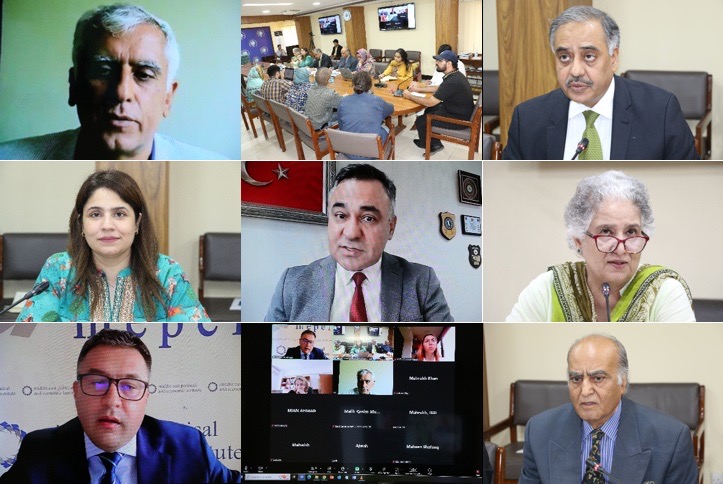ISSI holds webinar on “Elections in Iran : Regional and International Insights”

The Centre for Afghanistan Middle East and Africa (CAMEA) at the Institute of Strategic Studies Islamabad (ISSI) hosted a webinar, titled “Elections in Iran: Regional and International Insights.” The webinar was moderated by Ms. Amina Khan, Director CAMEA. Speakers included Ambassador Sohail Mahmood, Director General ISSI; Ambassador Khalid Mahmood, Chairman BoG, ISSI; Ambassador Riffat Masood, Pakistan’s Former Ambassador to Iran; Dr. Nabi-Sonboli, Senior Research Fellow at Institute for Political and International Studies (IPIS), Iran; Dr. Flavius Caba Maria, President and Director of the Political Department, Middle East Political and Economic Institute (MEPEI), Romania; and Dr. Murat Aslan, Senior Researcher SETA Foundation for Political, Economic and Social Research, Turkiye.
DG ISSI Ambassador Sohail Mahmood highlighted the importance of elections in Iran, particularly given the country’s regional and international significance. He noted that the recent elections, held after the tragic demise of President Raisi and Foreign Minister Abdollahian, resulted in Dr. Masoud Pezeshkian winning in the run-off garnering over 16 million votes. This outcome was surprising to many, as Dr. Pezeshkian was a relatively lesser known candidate and his previous two presidential attempts had been unsuccessful. However, Ambassador Sohail Mahmood pointed out, Dr. Pezeshkian was a seasoned parliamentarian, former Health Minister, and distinguished academic and surgeon. His victory, especially in northern and western provinces with significant minority populations, reflected substantial support from Kurds, Turks and Sunnis. He also secured substantial support of women and the youth.
Ambassador Sohail added that Dr. Pezeshkian’s campaign focused on reform, national unity, and international engagement, with priorities like lifting of sanctions and reviving the nuclear agreement with the West. Dr. Pezeshkian aims to balance relations with all countries, enhance regional partnerships, and explore economic and technological opportunities. The President-elect had critiqued the U.S. stance on the nuclear issue (JCPOA) and called for recognition of Iran’s legitimate rights. The DG ISSI underlined that Dr. Pezeshkian’s success will depend on support from national stakeholders, and the Supreme Leader, and would be assisted by a highly experienced diplomat Dr. Javad Zarif. He also mentioned that the U.S. election results and ‘balancing’ relations with China and Russia on the one hand and forging constructive engagement with the West on the other hand would pose a challenge. For Pakistan-Iran relations, Ambassador Sohail Mahmood stressed the potential for enhanced collaboration in trade and other sectors, continuing the positive and forward-looking trajectory set during late President Raisi’s visit to Pakistan.
Ms. Amina Khan noted that while Dr. Pezeshkian has made promises to moderate Iran’s conservative outlook, improve relations with the region and the West alike, including calls for negotiations as well as the potential revival of the Joint Comprehensive Plan of Action (JCPOA), many are of the view that he will carefully balance promises of change while remaining loyal to Iran’s Supreme Leader, Ayatollah Seyed Ali Khamenei.
She emphasized that under former President Raisi, Pakistan-Iran enjoyed strong ties which saw significant developments such as the opening of border markets and a shift towards barter trade to deepen bilateral economic collaboration. She also mentioned Pakistan’s Prime Minister Shehbaz Sharif’s congratulatory call to Dr. Pezeshkian, where both leaders expressed a desire to enhance cooperation in trade, energy, and regional security.
Dr. Nabi-Sonboli noted that Dr. Pezeshkian’s victory was unexpected and signifies a slight shift from the previous administration, where major changes are unlikely. The President-elect is expected to continue existing policies with moderate adjustments, focusing on national unity and forming a diverse government – which will signify a mix of change and continuity. Dr. Sonboli noted that Dr. Pezeshkian’s commitment to peace and diplomacy links economic development with regional stability, which will create opportunities to enhance Iran-Pakistan trade ties and address sectarian divides.
Dr. Flavius Caba Maria discussed the presidential process, noting that the core foreign policy principles are unlikely to change, though renewed nuclear negotiations are possible. He highlighted President-elect Dr. Pezeshkian’s likely focus on deeper ties with China, Russia, and BRICS+, and his commitment to national reconciliation in the Middle East, marking a new era which will bring both progress and challenges for Iran.
Dr. Murat Aslan highlighted the long-standing stability of Turkish-Iranian relations since the 1639 Treaty of Zuhab. He noted Turkish influence in Iran’s ruling elite and emphasized the 1979 Revolution’s initial broad inclusion before conservative control. Dr. Aslan stressed the importance of understanding Iran’s regional policies, particularly after the 1979 revolution which raised concerns in Turkiye. He said the Iranian ideology was perceived as a threat by neighbouring countries including Turkyie, given that Turkiye was a secular state despite having a conservative political party.
Ambassador Riffat Masood highlighted Iran’s unique governance structure, with the Rahbar holding the ultimate authority. She emphasized that preserving the theocratic system was at the core of this structure for ensuring stability and security. Ambassador Masood also dilated on the severe impact of sanctions, the JCPOA deadlock, and intensified opposition to Israel and the U.S. due to regional conflicts like Gaza. These factors influenced the election, leading to the rise of reformists and increased calls for economic reforms, social justice, and reduced international isolation.
During his concluding remarks, Ambassador Khalid Mahmood said that he expects limited changes, as the final authority remains unchanged, with existing regional policies continuing and some improvements possible. Ambassador Khalid Mahmood highlighted that while the Trump administration’s JCPOA withdrawal benefited Iran, the Biden administration maintained a similar stance. He observed progress in Iran-Pakistan relations but acknowledged unresolved issues. Despite this, he expressed optimism about the future developments.
Sub-Editor: Arslan